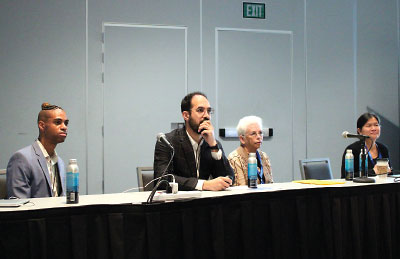When New York City had its first known case of AIDS, Francine Cournos, M.D., was the chief medical officer for the NYC Regional Office of the New York State Office of Mental Health. From that time on, “[a] lot of my job was to go to every state hospital after it had its first case and calm people down,” she said. There was enormous stigma around the illness when it was first discovered, she said. She described seeing an internist hug a psychiatric patient who had been diagnosed with AIDS and the tremendous effect that had on her and everybody who watched.
Cournos is a professor of clinical psychiatry in epidemiology at Columbia University and the principal investigator of the New York/New Jersey AIDS Education and Training Project. She spoke at APA’s 2023 Annual Meeting on the intersection of HIV and serious mental illness (SMI). She was joined by Alison Hwong, M.D., Ph.D., a psychiatry fellow at the University of California San Francisco (UCSF) Weill Institute for Neurosciences; Alexander Bazazi, M.D., an assistant professor of psychiatry at UCSF; and Andrew Sudler, M.D., M.P.H., a PGY-2 psychiatry resident at UCSF.
Hwong noted that people with SMI die about 15 to 20 years earlier than the general population; this gap has only widened since the 1970s.
In many parts of the world, studies have shown that HIV infection is more common in people with SMI than in the general population, Cournos said. Bazazi pointed out that the HIV prevalence is estimated to be around 6% among people with schizophrenia or bipolar disorder, which far exceeds the prevalence in the general population.
Bazazi shared some of the findings from ongoing research that he and his colleagues are conducting at UCSF with primary investigator Christina Mangurian, M.D., M.A.S. Using Medicaid claims data, they investigated whether there is a gap in retention in HIV care for people with schizophrenia compared with people without schizophrenia. In adjusted analyses, those with schizophrenia had a 9% lower chance of being retained in HIV care annually.
Finally, Sudler presented on the prevention policies and public health reform efforts for HIV prevention, particularly for people with SMI. He pointed to local efforts aimed specifically at people with SMI to get them to start taking pre-exposure prophylaxis (PrEP), which greatly reduces the risk of contracting HIV.
PrEP is one of the most effective biomedical HIV prevention strategies available, Sudler said, yet who prescribes the medication remains a controversial topic. Very often, the focus in the literature is on prescribing within HIV specialty care or primary care settings, and mental health professionals are left out of the conversation, which is concerning, Sudler said. Further, he pointed to a 2020
Psychiatric Services study that found that only 20% of surveyed mental health clinics serving people with SMI in New York offered PrEP.
There are numerous challenges that must be addressed to encourage more PrEP prescribing by mental health professionals, such as educating them about its efficacy and overcoming any potential hesitancies to prescribing it, Sudler said.
“Until we have a more perfectly integrated system, there should be no wrong door for getting HIV care,” Bazazi said.
There has been a significant amount of research and interest in treating individuals with first-episode psychosis because it leads to better outcomes, Cournos pointed out. The same emphasis must be placed on providing preventive medical care to patients as soon as they are diagnosed with an SMI.
The response to the HIV epidemic can teach today’s mental health professionals a great deal about striving to provide health care to everyone, no matter who they are or where they live, Cournos continued.
“There was something very unique that happened when a group of people got together, and that included psychiatrists, and said, ‘Look, everybody—no matter who they are and no matter what kind of stigmatizing condition they have—is worthy of good care,” she said. “There are many lessons that we shouldn’t forget.” ■

